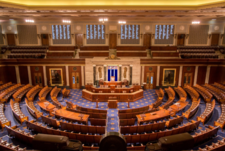Rizealand House of Representatives
This article is incomplete because it is pending further input from participants, or it is a work-in-progress by one author. Please comment on this article's talk page to share your input, comments and questions. Note: To contribute to this article, you may need to seek help from the author(s) of this page. |
Rizealand House of Representatives | |
|---|---|
| 50th Central Assembly | |
 | |
| Type | |
| Type | |
| History | |
| Founded | December 1, 1773 |
New session started | December 1, 2021 |
| Leadership | |
| Structure | |
| Seats | 535 |
 | |
Political groups | Majority (275): TNC CRP (122) NRP (77) SDP (76) Opposition (248): NPC New Dem (152) Dem (68) Greens (28) Minority (12) RSWI (8) Independent (4) |
Length of term | 5 years |
| Elections | |
| Closed list party-list proportional representation | |
Last election | October 7, 2018 |
Next election | October 1, 2023 |
| Meeting place | |
 | |
 | |
| House of Representatives Chamber People's Hall Camden, Capital Territory Rizealand | |
| Website | |
| www.hr.gov.rzl | |
The Rizealand House of Representatives, often known colloquially as Fed House or simply The House, is the lower house of Rizealand's bicameral legislature, the Central Assembly, with the upper house being the Federation Council.
Apportionment, qualifications, and membership
Representative apportionment
The composition of the House of Representatives is set out in Article 2, Section 7 of the Articles of the Federation. Unlike the Federation Council, which has an equal number of seats apportioned among each of Rizealand's states and tribal nations, all 535 seats of the House of Representatives are apportioned among Rizealand's political divisions in accordance with their population as determined in a decennial census. While each political division's seats are generally reflective of their population, each division is guaranteed at least one seat in the House of Representatives, irrespective of their population size.
In the beginning, the Articles of Federation did not specify a set number of seats for the House of Representatives. Instead, the Articles required that the House have one seat per 20,000 people. However, as Rizealand's population rapidly expanded during the nineteenth century and more states were added to the Federation, the size of the House of Representatives grew from 54 to 104 in 1813, 178 in 1833, 224 in 1843, 367 in 1863, and 421 in 1873. In 1882, the Articles were amended and the total number of seats in the House was permanently set at 500. During the 1975 Rizealand civil rights reforms, the number of seats in the House was increased to its present size.
Qualifications and elections
Article 2, Section 7 of the Articles of Federation only imposes two qualifications for members of the House of Representatives. First, one must be a citizen of Rizealand for at least five years prior to election. Second, one must be a resident of the political division they represent at the time they seek election and during their tenure in the House. While the Articles do not impose age restrictions on members of the House, there is a de facto requirement that members meet the age of majority in Rizealand (18 years) in order to sign candidacy forms and take the oath of office.
Historically, members of the House were elected in first-past-the-post elections from single-member assembly districts within each state that were drawn by state legislatures. However, the process often led to political manipulation of redistricting efforts or polapportionment in which the majority party in a state legislature would manipulate redistricting efforts to give their party an advantage in House elections for their state. The same process was also used to dilute the voting power or representation of minority communities in Rizealand. As a result of these drawbacks, 1975 amendments to the Articles changed the mode of election for House members in states and territories to a proportional representation system.
Under the current electoral system, political parties rather than individual candidates compete for each state and territory's seats in the House of Representatives. By the federal ballot nomination deadline, which is usually July 1 of the election year, each party must submit a closed party-list of candidates for each state and territory. On election day, voters in each state and territory cast their vote for a political party. Each state and territory's House seats are then filled by candidates from each party's list in accordance with their rank on the list and in proportion to the amount of votes received.
The process for being added to a party-list is not set by law and is dependent on the internal procedures of political parties. In states and territories with large House delegations like Lothicania (152 seats), New Estmere (86 seats), San Andreas (77 seats), and the Capital Territory (17 seats), political parties often fill their party lists with candidates selected in primary elections, caucuses, or local council meetings organized by each of the state or territory's administrative subdivisions (i.e. boroughs, counties, parishes, or wards). Ultimately, the final decision on nominations and ordering of candidates on the party list is made by the party's state conference or council.
Unlike states and territories who must select their House delegations as described above, Rizealand's three tribal nations are allowed to establish their own electoral system for choosing their House delegations. In both the Onnohou Nation and Nehinaw Nation, their House seat is filled by a nationwide two-round election. In the Powhatan Nation, the Great Council Fire fills the Powhatan Nation's three House seats by appointment.
Tenure, privileges, and benefits
Term and removal
By law, each member of the House of Representatives serves for a five-year term and is not subjected to any term limits. However, a member's tenure may be cut short by one of two ways. First, the House of Representatives may vote to remove a member from the House by a three-fourths majority. Second, a political party may remove their own member from the House. Originally, the Articles of Federation only allowed the House to remove its own members. However, with the introduction of proportional representation in 1975, political parties were also allowed to remove members from the House on the grounds that they and not the individual members were the representatives of the electorate.
According to the Articles of Federation, a political party's leadership may suspend any member of their party from the House of Representatives for a period of up to thirty days. Also, a political party's leadership may make temporary appointments to fill vacancies in the House for a period of up to thirty days, although they are not allowed to fill vacancies made by suspensions of members. Most political parties vest this authority to suspend and make temporary appointments in their House Floor Leader. Once a member has been suspended, they may only be permanently removed from office by their party's conference from the political division they represent. If they are not removed within thirty days, they are reinstated and cannot be suspended again for one year although they may still be removed from office anytime by their party's state conference. The party's political division conference is also responsible for making permanent appointments to fill vacancies in that political division's House delegation.
Because the House delegations from tribal nations are not selected through proportional representation, the second method of removal in the Articles of Federation does not apply to them. In addition to the first method of removal, they may also be removed as allowed by tribal law. In the Onnohou Nation, their representative may be removed in a recall election. In the Nehinaw Nation, the Nehinaw Tribal Council has the ability to remove the nation's federal representative by a unanimous vote. In both nations, vacancies are filled by the tribal executive until special elections can be held. In the Powhatan Nation, each chamber of the Great Council Fire has the ability to remove or replace their federal representative at anytime.
Titles
In official and formal settings, the names of House members are prefixed with "The Honourable." In debates and speeches on the House floor, members refer to each other as the "the Distinguished Gentleperson from (State/Territory/Tribal Nation)." Informally, House members are often referred to as federal representative, federal assemblyman or federal assemblywoman, and sometimes by the abbreviation "MCA" which is short for "member of the Central Assembly."
Benefits
As of 2023, federal representatives receive an annual base salary of €117,036 that is the same for all members, regardless of their seniority or leadership position. In addition to their base salary, members become eligible to receive a pension from the Federal Pension Fund. All members also enjoy government-sponsored life insurance plans, a travel allowance for government business, and a housing stipend. Lastly, members receive an office budget for opening an office in their home state, territory, or tribal nation and hiring between five to nine support staff that often include a chief of staff, director of communications, a constituent services director or outreach coordinator, and an administrative assistant in addition to policy, communications, and constituent services staff.
Role and powers
Of the two houses of the Central Assembly, the House of Representatives is the lower house and often considered to be more powerful and influential than the Federation Council. In addition to proposing and voting on legislation, the House has the sole perogative or responsibility to exercise the following powers:
- Impeachment: While the President, Deputy President, Attorney General, heads of independent administrative agencies, and federal judges may only be removed from office by the Federation Council or, in certain situations, by the electorate through recall elections, the House of Representatives has the authority to initiate removal proceedings by issuing articles of impeachment. Once the House passes articles of impeachment against one of the federal government officials listed above by a simple majority, the Federation Council must conduct a trial to determine if the official should be removed from office. The House of Representatives may also initiate a recall election against one of these federal government officials by passing a joint recall resolution (requiring a simple majority in both houses of the Central Assembly) or issuing a special recall resolution (requiring a two-thirds majority in the House).